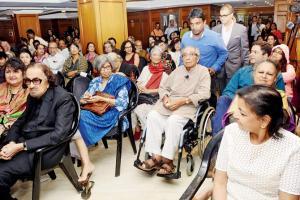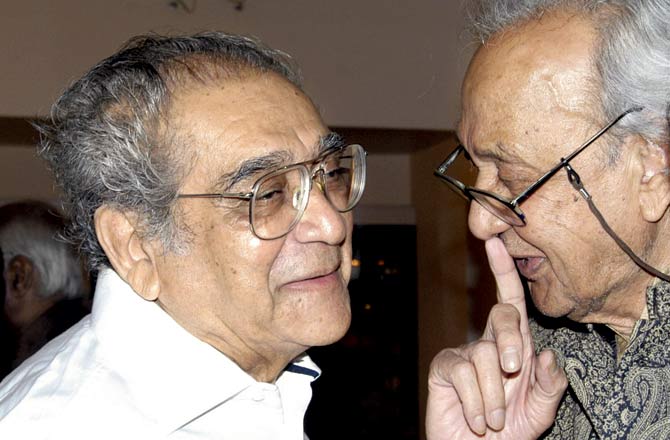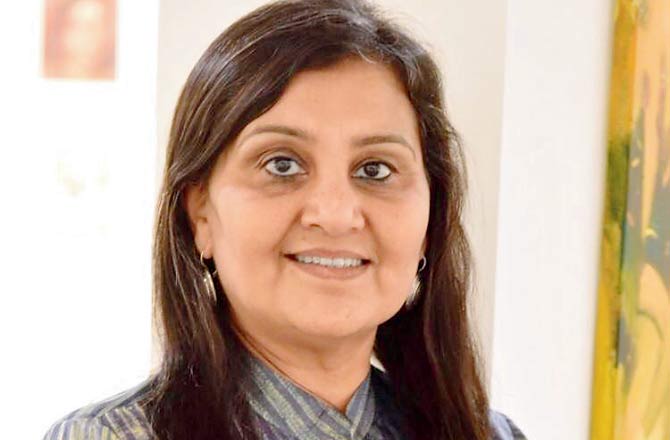Mumbai boy Akbar Padamsee was hugely creative but surprisingly practical for an artist, say those who remember one of the last stalwarts to make up influential Progressive Artists' Group

Akbar Padamsee and brother Alyque Padamsee (in black suit) seen in the same frame
One of India's greatest artists, Akbar Padamsee, 91, passed away at the Isha Yoga Centre, Coimbatore, from natural causes. He was an avid follower of Sadhguru Jaggi Vasudev. Born in Bombay in 1928, he graduated from Sir JJ School of Art and left for Paris in 1951 where he lived and worked until his return in 1967. Part of the Progressive Artists' Group with FN Souza and SH Raza, he also delved into photography, sculpture and film.
The man
Dadiba Pundole of Pundole Art Gallery met him when he (Pundole) was very young and remained surprised that they got along despite Padamsee being the intellectual among painters. "He never treated me like a child. It was his urge to learn that made him never write off anyone," said Pundole, who remembers him fondly for the conversations over tea and drinks. To illustrate Padamsee's thirst for knowledge, Pundole recounts an incident when he brought his plumber to the gallery to meet him and Padamsee said of the man, "He speaks with wisdom. There is so much to learn from him."

With artist S H Raza
Pundole remembers that the one thing that made Padamsee special was his distinctive tactile nature. "Artists aren't known to be tactile. He was the exception to the rule, practical in his life and living. He would always say, 'Don't upset yourself over something you can't control'," said Pundole.
The artist
While Pundole grew up admiring Padamsee's work, Kamini Sawhney, curator of the Jehangir Nicholson Art Foundation (JNAF), first met Padamsee in 2012 when he came to the gallery for a talk. His daughter Raisa had brought him along, and he reminisced about visiting SH Raza in Paris, while leaving his dear friend FN Souza envious, begging him to spend time with him in Bombay. This week will see the opening of an exhibition showcasing 22 of Padamsee's works in the Jehangir Nicholson Collection — a prolific display ranging from works of charcoal to oil, figurative to mirror images. Sawhney added, "It is a tribute to an artist who combines a humanistic approach with a keen aesthetic discipline. The process of creation is deeply introspective allowing for the articulation of thoughts and ideas that are almost spiritual. During a career that explored a wide range of mediums, Akbar Padamsee managed to remain fiercely experimental and individualistic. With his passing, we have lost one of the last few pioneers of Indian modernism."

Shubha Maudgal, executive director, Cancer Patients’ Aid Associatio
The filmmaker
Director and screenwriter Ashim Ahluwalia was introduced to Padamsee when the artist was 87 — still sharp, gentle and secure in his art practice. "But I had no idea that he had made two forgotten experimental films," he said. The films made in the late 60s - 70s were showcased in private screenings or at galleries, and didn't garner a positive response. "He was so ridiculed for making them that he put the films away and never mentioned them. I was keen to dig out that side of his career and we ended up collaborating on a film together. It was truly beautiful since we were so many years apart but we got so much joy working together," Ahluwalia recalled. Padamsee's Syzygy is the only film that survives today — "It is an absolute beauty made up solely of lines and dots and the connections between them. There is nothing else in Indian cinema history like this." Syzygy is now being screened by museums internationally.
Family man
"I remember him on a wheelchair with a glass of wine," theatre personality Raell Padamsee said, of her uncle. The artist was responsible for some of the most stunning artwork to be used in her production, including the tantrik version of Macbeth staged in 2006. That was when she said, she fell in love with his mind. "He was so prolific and was an extremely content person — sanguine and calm even when talking about the most vitriolic of things. He would also try and come for as many family gatherings as he could," she shared.

Raell Padamsee
Heart of gold
Cancer Patients' Aid Association (CPAA) organises an annual fundraising exhibition wher Padamsee's works featured from 2008 to 2013, before ill health followed. It was in 2007 that Shubha Maudgal, executive director of the CPAA, got the artist onboard to donate one black and white drawing a year. "He called us to his Prabhadevi home and we sat in his studio. I was amazed by how self-conscious he was; he spoke of his work in such detail and was also interested in ours," she said. Maudgal also mentioned that Padamsee's drawings resonated with cancer patients, adding, "His subjects encapsulated the pain patients were going through but also reflected the feeling that they can triumph".
The shadow of a man
By the time Deepti Anand and Sanghamitra Chatterjee, co-founders of Past Perfect (an archiving and research agency) met Padamsee, he was ill and not too sharp with his memory. They recall being unable to imagine him as the man who fought hard for his freedom of expression and that of his contemporaries. "We saw a shadow of the man that he was, the visionary, sitting across the room in his studio, on a wheelchair," recounted Chatterjee. Documenting his life through non-art material, external research and interviews, Chatterjee and Anand were keen on tracing the trajectory of an oft-repeated pattern. " picked up something new took it to its peak before he abandoned it," said Anand.
With limited time, the two would have to jog him down memory lane to document aspects of his life including the inventive Vision Exchange Project of 1969 that his wife Bhanu Padamsee was keen to preserve. Yet, they were told, he was always aware of who was in the room. "There were moments, through our work, when all it took was a single sentence from him to put things in perspective," said Anand.
Catch up on all the latest Crime, National, International and Hatke news here. Also download the new mid-day Android and iOS apps to get latest updates
 Subscribe today by clicking the link and stay updated with the latest news!" Click here!
Subscribe today by clicking the link and stay updated with the latest news!" Click here!









